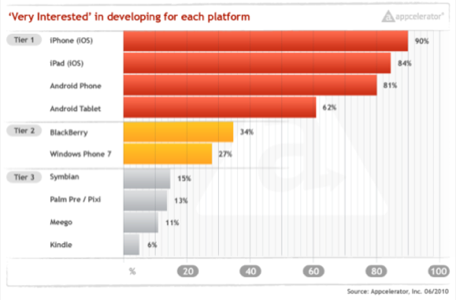A recent survey of 2,733 mobile application developers has shed new light on the so-called Apple vs. Google battle that’s taking place in the smartphone industry, pitting Apple’s dominant iPhone/iPad operating system (iOS) against Google’s mobile operating system, Android.

The survey, conducted by mobile app development company Appcelerator, asked a representative sample of its 51,000 customers to weigh the pros and cons of both the Apple and Google mobile platforms, among other things. According to the findings, developers view Apple’s near-term outlook favorably, given its App Store, large market share and device line up. However, it’s Android’s adaptability as a platform that had developers pegging the OS as the best bet for long-term success.
Near-Term Dominance Makes Apple Number One Pick… For Now
It should come as no surprise that developers overwhelming picked Apple’s iOS (formerly iPhone OS) mobile platform for near-term success, given its market dominance. But when asked for more details, 69% of developers said that Android’s potential for long-term success was greater due to its ability to extend to other devices, including tablets, e-Readers and set-top boxes.

Appcelerator positioned this battle as one between “near-term momentum” and “long-term dominance,” but there’s a flip side to the fight which wasn’t fully considered: the battle of the cons between the two platforms, which was a survey question that was left, for the most part, unexamined.
When reporting on the downsides to the two dominant OSs, developers said that Apple’s worst “con” was its closed and controlling nature. iPhone (and iPod/iPad) applications aren’t immediately accepted into the iTunes Application Store – they’re “curated.” Or at least that’s how Apple CEO Steve Jobs describes it, referring to the company’s complex app approval processes and lengthy developer agreements that describe, in detail, what Apple mobile apps may and may not do. And Apple changes its terms with alarming regularly, often to shut out competitors like Adobe and Google, the former whose iPhone app creation tool has been banned, and the latter whose mobile advertising venture competes with Apple’s newly launched iAd program.
On the flip side, when it comes to Android, developers who were asked about the OS’s downside came up with one major concern: fragmentation. Not only are there multiple versions of the OS out there, there are a plethora of form factors as well. LG alone announced it’ll have 20 Android phones by year-end, noted Scott Schwarzhoff, Appcelerator’s VP of marketing, and even Google itself is porting Android to other platforms, most notably Google TV.
In the end, the battle may not be a case of which is better (near-term dominance or long-term success) but which is worse: a closed and controlled ecosystem or a fragmented one?
Other Findings: Tablet Interest Growing Rapidly
In addition, the survey found growing interest in the tablet form factor among developers in terms of application development. In particular, interest in the iPad increased by 26 points since the prior quarterly survey to 84%, ranking it number two behind the iPhone. Android tablets, meanwhile, came in fourth at 62%. Other platforms, including Blackberry, Windows Phone 7, Palm’s webOS, Symbian, Meego and Kindle remained 30 points or more behind the platform leaders, iPhone, iPad, Android phones and Android tablets.

For more findings, including details on other platforms, iPhone 4 interest and insight into developer mindset in large organizations, you can read through the remainder of the survey here.




















